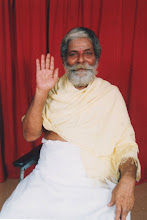4.41. This being the penultimate verse in the chapter, it is a beautiful summary of all the main secrets-of-life explained at length in it. When, through the practice of Karma Yoga, we have learnt to renounce our attachments to the fruits-of-action, and yet to work on in perfect detachment --- when every doubt in us regarding the Goal-of-life has been completely removed in our own inner experiences of the nobler and the diviner in us --- as a result of the above two, the ego comes to rediscover itself to be nothing other than the Atman. Then the individual ego comes to live "POISED IN THE SELF AS THE SELF." When such an individual works, his actions can never bind him.
It is only egoistic activities motivated by our ego-centric desires that leave gross impressions on our inner personality, and thus painfully bind us to reap their reactions. With a sense of detachment and in right-knowledge, as indicated in the above scheme, when an individual has completely destroyed his ego-sense, his actions cannot bind him at all. As a dreamer, I might commit a murder in my dream, of my dream-wife, but when I awake from my dream, I shall not be punished for the crime that I seem to have committed in my dream. For, the dreamer has also ended along with the dream. The dreamer committed the murder and deserves punishment; but in the waker, the dreamer is absent. Similarly, the ego-centric actions can bind and throttle only the ego, but when the ego has become Atmavantah, meaning "POISED IN THE SELF" --- just like the dreamer when he gets poised in the waker --- the activities of the ego can no more bind the Self. The ego "POISED IN THE SELF," is the experience of the Real Self; the dreamer poised in the waker, is the waker.
THIS BEING THE WONDROUS RESULT AND THE SUPREME PROFIT THAT 'TRUE-KNOWLEDGE' CAN GIVE TO THE DELUDED, KRISHNA ADVISES ARJUNA:
4.42. In this concluding stanza the Lord's advice is precise and it is given with a loving insistence. The stanza rings with a spirit of paternal urgency felt by the Lord towards the Pandava Prince. In the language of war, Krishna advises his warrior-friend on the battle-field, how best to live the life of dedication and perfection as advised by the Hindu Rishis from the quiet and peaceful Himalayan valleys. With the "SWORD-OF-KNOWLEDGE," Arjuna is encouraged to cut off the bonds of ignorance and 'CLEAVE ASUNDER THIS DOUBT-OF-THE-SELF LYING IN THE HEART."The spiritual doubt is explained here as working from the heart. This may read rather strange to a modern man: doubt must come from the intellect; it cannot come from the heart. It is the traditional belief in Vedanta that "the intellect is seated in the heart," wherein the term HEART does not mean the fleshy pumping-instrument in the human bosom. The term HEART is used here not in its physiological meaning but in its literacy usage, where HEART means "the source of all love and sympathy --- of all noble human emotions." An intellect functioning from and through an atmosphere of sympathetic love, kindly charity and such other noble qualities alone can be considered in the science of philosophy as the human reason. Therefore, when the Upanishads talk of the doubts lying crystallised in the heart, the Rishis mean the intellectual perversions in some of the seekers that make them incompetent to feel and appreciate the Vision-of-the-Soul.
These doubts can be completely annihilated only when the individual gains an intimate, subjective experience of the Self in him.
This can be achieved only by Yoga --- NOT a strange mystical process, secretly advised to a few, by mysteriously rare groups of Gurus, to be practised in the unknown dark caves of the Himalayas, living altogether a frightful life of unnatural privations. In the Geeta, the word Yoga has been forever tamed and domesticated to be with all of us, serving us faithfully at all times in our life. By the term Yoga, in this last stanza, Krishna means the "twelve techniques" which he has explained as the subjective-Yajnas.
The chapter concludes with a spirited call to Arjuna: "ARISE, O BHARATA." In the context of the Geeta, though the word may be rightly said to mean only a call to Arjuna, it is a call to every seeker --- especially to this country as a whole --- to get up and act well in the spirit of Yajna, and thereby to gain more and more inner purity, so that through true meditation everyone of us can come to experience and gain the Supreme Peace which is the final fulfilment of evolution.





No comments:
Post a Comment